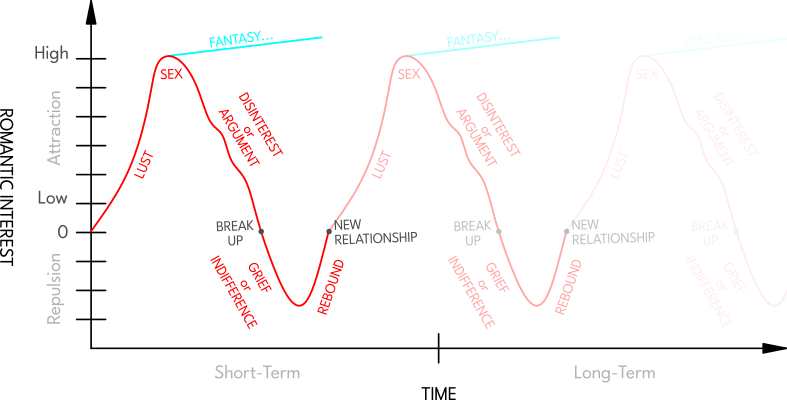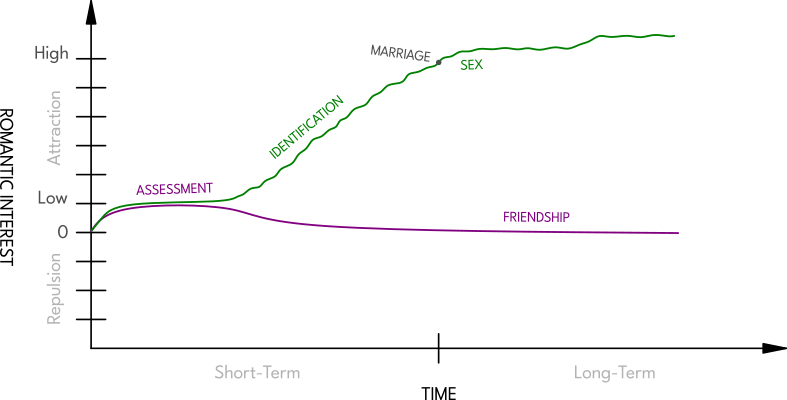Back • Return Home
Attraction In Relationships
Hills & Valleys
Sometimes people get excited about someone whose looks they find attractive and they want to move towards physical intimacy as fast as possible.
Their standards for looks may be high (demanding particular physical characteristics - such as a specific age, height, weight, skintone, hairstyle, smile, fashion, etc.), or low (accepting of nearly anyone who would accept them in return).
Either way, their needs for mental-emotional intimacy are not primary if they put the desire for physical intimacy before them. It would seem that many people get into the habit of entering into relationships based off of superficial characteristics, get deep into physical intimacy, and then break up when the passion fizzles out and they come to find that they are not alike in the ways that matter most. It is a rollercoaster of bodily desire.
Let's attempt to visualize this process...
The red wave is what is actually happening, while the blue wave is what is hoped for. Instead, what often happens is this...
Fueled by passion and fantasy, failed romantic relationships and heartache occur cyclically. How can we break this cycle? By making our approach the exact opposite:
Only accept physical affection as a consequence of deep mental-emotional intimacy, and gradually increase it over time as more closeness develops, after reasonable boundaries are set and spiritually meaningful experiences are shared. While there is still risk, especially if one is not careful, the likelihood of incompatibility is lessened because we are taking the time to understand each other thoroughly before trying to bond through the physical.
Let's attempt to visualize this process...
The purple wave shows a friendship, while the green wave shows a romance. While our romantic interest should also be our friend, not every friend can or should become a romantic interest. What makes each type of relation different for you? Take some time to determine this before trying to form any kind of relationship. For example, if mental-emotional intimacy is suffering in some way, the less inclined a person might be in engaging in physical intimacy. However, some people try to use physical intimacy as a way to "make up", to "de-stress", etc. These behaviors might be incompatible. This is part of the reason why taking the time to understand one another is important. These choices (and the motivations from which they flow) differ from person-to-person and are not always readily apparent.
Some might wonder why "sex" is shown after "marriage" in the above diagram. To some, sex does not mean much of anything. Their sexual desires are like hunger pangs, and they eat whatever is available to them whenever they are hungry. Dating becomes like "window-shopping" and they take people for a "test-drive" sexually. To others, sex might be something intensely private and bonding. They are only ever willing to share it with specific people and within particular contexts. Dating becomes "courtship" and sex is the culmination of it. Some might lean in either direction at different times within their lives. In general, being forthright about expectations and discerning about other people's character can keep any type of person from becoming disappointed in where a relationship is headed.
Similar ideas apply to the concept of "marriage". For some, "marriage" could be:
• a social obligation, something that is done to appease family or friends
• a status symbol or rite of passage, something that they "have to do" to be considered "successful", an "adult", etc.
• a business contract, an exchange of goods / services (e.g.: trading sexual intimacy for financial security, or vice versa)
• a deed of ownership, something done so that they can have someone to serve them
...etc.
Notice that none of these have anything to do with the nature of the relationship itself. The relationship is only used as a means to get something else done.
Therefore, is the relationship truly about furthering equality and companionship? If so, then we aren't likely to achieve that by following the path of the red wave.
A helpful way of defining "marriage" is: A monogamous romantic relationship founded upon mutual passion, intimacy, and commitment. Ideally, it is a promise that is eternal followed through with action that is consistent. Both persons sincerely want to contribute something meaningful to the relationship and choose to continually grow together. Both are completely forthright about who they are and fully accepting of one another.
What Are Reliable Indicators of Compatibility?
Looks and tastes are highly changable. Some features and pastimes may stick with us throughout our growth, while others may change completely over a short span of time (e.g.: one's preferences regarding food choices may change suddenly with a particular health situation).
The personality (how one interacts with others) is not wholly stable either. It is mutuable to some degree, growing with experience and varying to some extent depending on the context. For example, the relation that you have with your friends is quite different from the one that you share with your parents, but certain aspects of you will be consistent across both kinds of relationships. However, the persona can also act as a facade to hide something (either intentionally to manipulate or unintentionally out of shame / guilt / embarassment). It is a choice how one presents themselves to another, and sometimes "looks can be deceiving". Do not pretend to be something that you're not just to get others to like you, and be wary of those who do.
The core values that make up one's identity usually change more slowly (unless radically altered by a sudden and profound shift in consciousness). Therefore, core values are more reliable as indicators of compatibility than personality, tastes, or looks, but they often take a lot more time to uncover! While personality, tastes, and looks may sometimes be a reflection of core values to a limited extent, we cannot rely on an understanding of them alone.
Ultimately, compatibility is being complementary in the ways that matter most to both persons. The things that are most enduring are based in sincere caring given voluntarily. [As mystical as it may sound, this is because The One is Infinite and Eternal Love. That which is aligned with The One will last forever.]
Beauty cannot tell you what is in another's mind or heart. Therefore bodily passions arising in response to beauty are not reliable indicators of compatibility. That is not to say that you cannot appreciate someone's beauty, just that it shouldn't influence assessment of compatibility. Look to their character. What do they find most important?
Sexual intimacy can be particularly emotional, creating strong memories, so engaging in such actions before truly assessing compatibility can blind one to the facts and lead to the projection of one's fantasies upon the situation. Always ask, "Is this a temporary high? Or does this have deep and lasting meaning? [And most importantly, is it aligned with The One?]" Again, to some, sexual activity means nothing more than a release of bodily tension, a way to relax, or a bodily thrill, something "fun" to do that does not require any kind of commitment; to others it can be intensely personal and private, only to be shared within the context of marriage.
The fun you have together while out on a date can also be an exhilarating experience that some might find bonding to some degree. While we should have fun together during courtship, shared moments of fun may not always be present within the relationship over time as life changes. Courtship is for assessing whether core aspects of the person that you intend on being with romantically will lead to long-term happiness for you both through shared growth. It should not proceed so fast that these aspects are accepted before they even become clear, nor proceed so slowly that assessment itself becomes an excuse to hide a fear of commitment.
What Makes A Person Trustworthy?
Determining these things can be tricky sometimes. Here are a few characteristics that make a person "trustworthy"...
• An agreement between, or matching up of words and actions
• Keeping your word, especially when making promises; follow-through in doing what you say you will
• Consistency of behavior; no huge shifts in personality that appear suddenly and in an erratic way; generally the same in public and in private (in the sense of refusing to be secretive in order to be dishonest, not in the sense of being open-handed with confidential information)
• Defends your dignity even when you aren't around; no gossiping or talking about others behind their back
• Reliable, dependable; won't leave when you sincerely need help
• Honest, truthful (does not lie through fabrication, withholding, or exaggeration)
• Considerate, tries to gain an understanding of your situation without condemnation or making assumptions
People have certain criteria that must be met before they are willing to open up about more personal aspects of their being (even those people who may seem completely open and carefree). This is usually an assessment of character of some kind (e.g.: Are they trustworthy? What are their intentions towards me? What are the motives behind these behaviors? Can I share without fear of condemnation?).
Relationship Changes
One should not enter into a relationship with the intent of changing another, or with the secret desire that the habits they hold will change once [blank] happens (e.g.: after marriage).
However, at the same time, change is constant and couples should account for it, with both persons trying to grow closer together rather than allowing themselves to slip further apart over time (by taking each other for granted, becoming indifferent to one another's interests, etc.). This can be difficult sometimes. For example:
• What if your partner changed dramatically due to an illness and they needed your care? Will you stick around under trying circumstances?
• If you are in love with who a person is, should looks matter? What if they were in an accident that left them disfigured? Would you still be attracted to them?
...etc.
We are not always in control of the situations that we might encounter, but we can always choose how we respond.
Conclusion
We sincerely hope that this article can help you determine the type of relationships that are most appropriate for you.
Thank you for reading! ❤️



